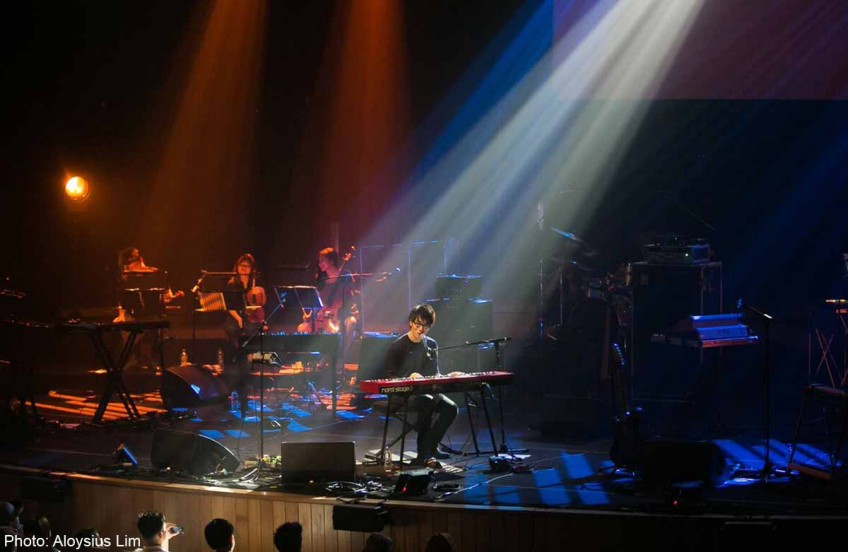Local indie musicians prove their mettle

At the end, the question to ask was not: Is made-in-Singapore music on a par with the world's best? It was and should always have been: Why should there have been any doubt in the first place?
Together, in a three-hour show, singer-songwriter Inch Chua, followed by rockers The Great Spy Experiment and, finally, multi-genre wonder boy Charlie Lim resoundingly answered the first question in the affirmative. Just because a question need not be asked does not mean a retort to it cannot be fired with gusto.
In holding the first gig at Esplanade Concert Hall, Singapore's best music venue bar none, to have local independent music acts take centre stage, local record label House Of Riot clearly had a point to prove - and said so as much in a video between the first two acts.
Unlike in the realm of classical music, where Singaporean talent has won plaudits on the international stage, there have long been aspersions implicitly cast on and prejudices privately held against local musicians in popular music, especially for those working in the English language, a tongue inherited from our ex-colonial masters.
In popular music, judgments can be formed emotively more than objectively, habitually more than intellectually; bands dismissed for not sounding like American, British or European pop/rock stars.
Neither Chua, Lim nor Great Spy Experiment perform in distinctly Singaporean accents. But that's not why they - particularly the latter two - were so good last Saturday in front of a near-capacity crowd.
As musicians, they proved their mettle in the language of music: Chua exploring her identity in the singer-songwriter sub-genre, Great Spy licking every single convention in emo/Britrock and Lim in command of more genres, time signatures and off-kilter rhythm than some musicians know.
While Chua has a great voice that can soar as stunningly as it can purr and coo, she seems at best to be finding her footing, particularly when backed by a strong band that occasionally overwhelmed her on the night.
The abrupt loud-soft dynamics in a number of her songs during her 50-minute set, not to mention the ineffective use of a small string section, could make her seem a little too self-conscious as a songwriter and arranger.
In movie terms, she might be the film school graduate whose clever little self-referential dramedy would make a small splash at Sundance but get lost at Cannes.
Great Spy, playing their last show as a band before breaking up, turned in an hour-long performance that packed as much musical wallop as emotional.
Almost the entire audience - including many loyal fans who have followed them right from the start 10 years ago - were on their feet from the first note to the last. No one really cared that frontman-guitarist Saiful Idris' vocals were off-form after completely losing his voice two days before the show.
Even a person encountering Great Spy for the first time that night would immediately know why they command such fervent support: The quintet are in total control of every aspect that makes Noughties Britrock great: the earworm guitar riffs, the emo shouty sing-alongs, the fuzzy guitar solos that stop just on the right side of tasteful, you name it.
Their music is the equivalent of a big- budget Hollywood action blockbuster - loud, proud and crowd-pleasing in the extreme. It doesn't really matter who is helming it, it looks and sounds just like those before it and is every bit as good as any.
And then there's Charlie Lim, whose name is as ordinarily Singaporean as his music is extraordinarily without boundaries.
More than plying his trade in different music genres - jazz, funk, soul, R&B, electronica, whatever - more than mashing up musical idioms and conventions, he transcends defined styles with a masterly, if impish, hop, skip and jump. He takes you through a musical wonderland that surprises at every turn, painting emotions with vocal runs, exquisite arrangements and an impeccable grasp of time and pace.
One would think it would be near impossible to follow a well-loved band's highly emotional last show, but Lim made it look as simple as his easy-going, self-deprecating between-song banter.
By the end of his 65-minute set, he earned a well-deserved standing ovation from the crowd.
If Chua, who was once based in the United States, represents a Singapore music past that was striving to prove itself on the world stage and Great Spy stand for a present that is the equal of almost any act in the world, Lim is the future, where local musicians have nothing to prove anymore and their biggest satisfaction comes from overcoming challenges that are not yet known.
andychen@sph.com.sg

This article was first published on June 8, 2015.
Get a copy of The Straits Times or go to straitstimes.com for more stories.